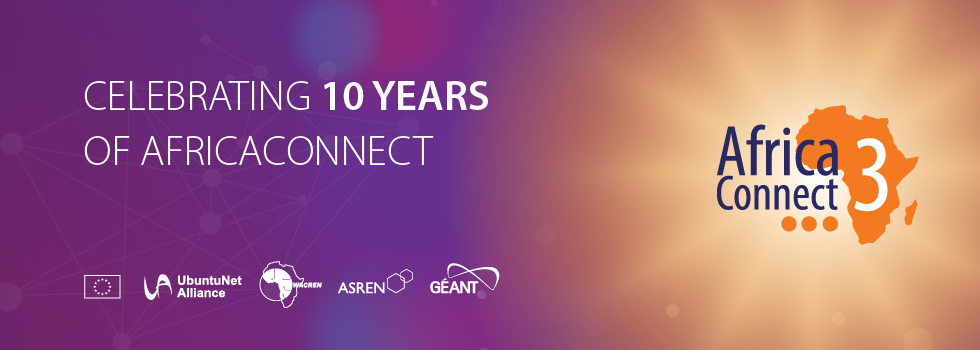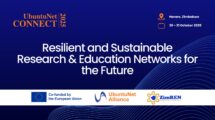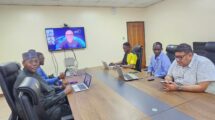Words: Silvia Fiore, GÉANT
On May 11th 2021, 10 years after the start of the first phase of AfricaConnect, we celebrate the achievements and get ready for the next steps.

The FEAST Study had explored the modernisation and development of research and education (R&E) in Sub-Saharan countries by providing access to the global research and education network infrastructure. It laid out the foundations of the EU co-funded AfricaConnect project.
Who was involved?
AfricaConnect set out to plan, procure, build, operate and maintain a dedicated high-capacity data-communications network for R&E communities across Southern and Eastern Africa. By connecting to the pan-European GÉANT network, African NRENs were able to offer direct high-speed intercontinental connectivity for its users, as well as the shortest and fastest possible network routes for their data traffic within Africa, as well as to and from Europe.
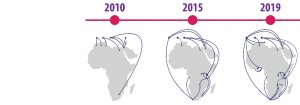
The project kicked off with 20 Partners: the UbuntuNet Alliance, the Association of African Universities (AAU) as well as various African and European NRENs. As the activities unfolded, the funds also increased.
Based on a proven model of building and interconnecting NRENs in regional networks, in 2015 the second phase of the project, AfricaConnect2, opened a new chapter in this African success story by extending the scope of its predecessor to a pan-African level. More partners joined, including more African NRENs in Southern and Easter Africa, and two more regional networks: the West and Central African Research and Education Network (WACREN), and the Arab States Research and Education Network (ASREN) for Northern Africa. Now in its third phase, AfricaConnect3, the project counts 35 member countries with a total of 40 R&E organisations enrolled.
Why AfricaConnect?
AfricaConnect was created to respond to the need of providing African research and higher education institutions with access to the global R&E network infrastructure so that they could jointly tackle universal challenges to humanity with their peers in Europe and other parts of the world.
The project acted as an accelerator to the development of African NRENs and a catalyst for global R&E cooperation. The terrestrial connection to the UbuntuNet backbone and the international interconnections with GÉANT, together with the already existing critical mass of successful national networks, encouraged other African NRENs to develop their services and eventually join the network. This cascade effect continues today with an increased focus on global and regional partnerships for training and workshops aimed at building human capital, adequate capacities and expertise within the African R&E communities so that they can efficiently serve their users. Key to ignite this momentous evolution for African NRENs have been the joint financial contributions coming both from the European Union’s – for a total of 61.8M euros, and the African partners – for 17M euros, over the course of the last 10 years.
African NRENs are now at the forefront of ICT development in the continent by contributing to narrow the digital divide and making a meaningful contribution to the fulfilment of the United Nations’ Sustainable Development Goals (SDGs). More specifically, NRENs are able to guarantee quality education (SDG 4) to African researchers and learners, boost industry and catalyse innovation in novel sectors (SDG 9), create new decent jobs (SDG 8) and narrow the gender gap in science, technology, education and mathematics (SDG 5).
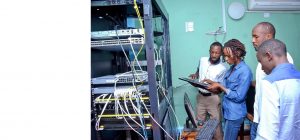
African NRENs do not only establish high-speed networks to interconnect universities, colleges, and research centres across Africa, but also deploys a wide range of services that allow instructors, scientists and students to seamlessly access a wealth of invaluable R&E resources. These include cloud technologies, high performance computing, digital repositories, online libraries, ODeL (Open and Distance eLearning), and services such as eduroam and eduGAIN, which facilitate a seamless WiFi connection for students.
What have African NRENs achieved so far?
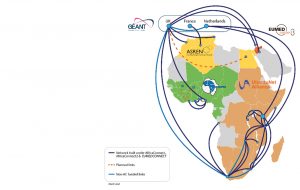
10 years ago, AfricaConnect partners set up the objective of fostering the development of cooperative research programmes between the European and the African R&E communities. Since then the collaboration between the two continents has celebrated numerous achievements. The successful performance of surgical operations in remote hospital facilities with online support from overseas (see RENU surgery story) and the inclusive initiatives for new African voices to be take part in the scholarly communication landscape (see the LIBSENSE initiative) are only a few of the many examples of AfricaConnect’s societal impact.
To date, over 5 million users in +1,600 institutions benefit from AfricaConnect’s dedicated, high-capacity and affordable internet connectivity and services. Thanks to their bulk purchasing power, African NRENs were able to increase the network capacity up to 60% in Zambia and to reduce internet prices by 97% in Algeria for the greater advantage of local researchers and students.
Great attention has also been paid to strengthening human resources capacities and expertise at different levels across the R&E communities to retain local talents and curb brain drain. African NRENs are running women empowerment initiatives, virtual hackathons and, throughout the years, have also partnered up with European NRENs and leading network organisation, such as the Network Startup Resource Centre (NSRC), to offer engineering assistance and technical training on Network Management, Cloud and Trust & Identity services.
More recently, with the COVID-19 pandemic outbreak, the African NRENs have once again proved how vital they are to the very survival of higher education institutions. Their services have been supporting institutions all across Africa in the switch to online education with a vast service offer, including online video-conferencing tools, e-learning management platforms, discounted data bundles for university students, and university’s WiFi outside of campuses (see eduroam story and other examples).
Where are we at now?
During the first two phases of the project – AfricaConnect (2011-2015) and AfricaConnect2 (2015-2021), partner regional and national RENs have better established themselves in the African digital landscape carrying the voices and needs of their end users.
The current phase, AfricaConnect3 (2019-2023), is continuing to accelerate Africa’s scientific and educational breakthrough at a global scale, reinforcing relationships with Europe and beyond. It will continue to develop new direct connections, especially from West and Central Africa. Africaconnect3 is a renewed commitment with local African partners and the European Commission’s Directorate-General for International Partnerships (DG INTPA), aiming at further extending the reach of the regional R&E networks, greatly improving access for researchers, students and institutions to digital infrastructures and technologies, connecting Africa to unlimited possibilities.
Watch the video at the top of the page for more detailed examples of how AfricaConnect member NRENs and institutions are improving and enabling access for researchers, students and institutions to digital infrastructures and technologies.
Read the article in French: AfricaConnect: 10 ans de collaboration afro-européenne

